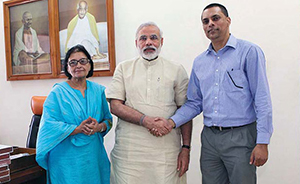And now, days of disruptive diplomacy
For the first time, the world is experiencing ice-breaking events that are not attributable to global warming. But they are definitely related to warming of another kind. There has been a sudden surge of warming of bilateral and one-to-one interactions among nations. Multilateralism is on the back-burner, at least for now. The United Nations is resigned to the position of a passive bystander. Regional groupings are curious ringside onlookers
The last such out-of-box diplomacy of recent times was seen almost 35 years back. In 1971, the so-called “ping-pong-diplomacy” triggered by table tennis players from the US was seized by Chairman Mao and responded to by Henry Kissinger, the US Secretary of State--and gave both countries the confidence to thaw their icy relations. The initial moves were shrouded in secrecy and intrigue. In July 1971, Kissinger faked “illness” to avoid the paparazzi closely following him while on a visit to Pakistan and did not appear in public for a day. He was actually on a top-secret mission to Beijing to negotiate with Prime Minister Zhou Enlai about a visit by President Nixon to China, which eventually did take place soon after.
The subsequent “shuttle-diplomacy” for the Palestine-Israel peace deal by Kissinger was effective to a certain extent. The final peace deal was clinched, however, through intimate bilateral interaction facilitated by the passive but positive role by Norway.
The informal dialogue with the “Chai-Diplomacy” between Prime Minister Narendra Modi and President Xi Jinping on the banks of the Yangtze river in Wuhan in April was indeed a unique event in more senses than one.
Firstly, it was initiated by China after an eyeball-to-eyeball military stand-off between the second and third largest economies of the world. Second, the two leaders spent more quality time together than scheduled--for two days, away from their capitals, without aides who often display classical hawkish diplomacy--to give a strong, positive message to the world.











Comments.